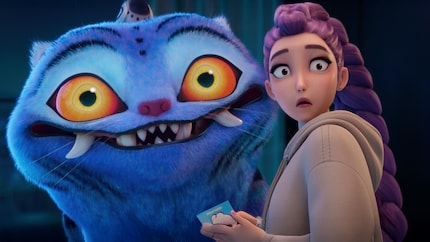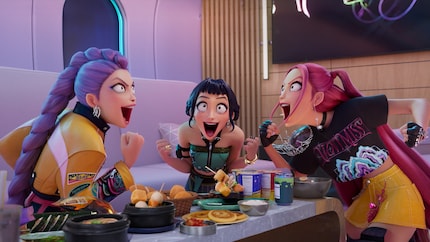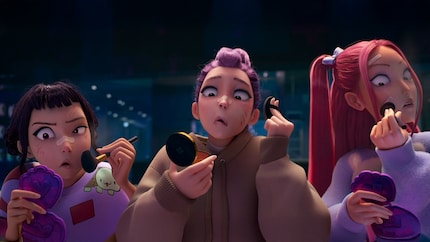
Background information
Anime over Hollywood: how Japan is redefining storytelling
by Luca Fontana

A K-pop girl band hunting demons at night may sound bonkers, but it went on to become Netflix’s biggest animated hit. Still, K-Pop Demon Hunters is more than just a film. In fact, it’s a valuable lesson on Hollywood’s blindness and the rise of Asia.
When K-Pop Demon Hunters dropped on Netflix in June, something happened that you don’t see every day in Hollywood. An animated film triggered the biggest cultural earthquake since Frozen. From international charts to TikTok, cosplay trends to broken streaming records, K-pop and demon-hunting were suddenly everywhere. A new franchise potentially worth billions was born.
And the wildest thing about it all? Sony practically handed it over to Netflix on a plate.
But more on that later.
When Maggie Kang first pitched her idea to Sony in early 2020, she wasn’t exactly a star director. Instead, she was an unassuming storyboard artist who’d worked on films such as Rise of the Guardians and Puss in Boots. But the idea she had in mind was more personal than anything she’d ever drawn before: a K-pop girl band that hunts demons at night.
It was crazy, over-the-top and an ode to her Korean roots.
Unlike many other Hollywood projects, it wasn’t a soulless pitch – it was a piece of biography. Maggie was born in Seoul, grew up in Canada and, as a teenager, often had to hide her passion for K-pop and Korean folklore because she was laughed at for it. This was the very thing she wanted to turn into a story. One that included so-called idols, who, rather than being perfect and unapproachable, were quirky, funny and vulnerable. Just like Maggie herself.
Aaron Warner, producer of Dreamworks’ Shrek and now a Sony producer, immediately recognised the idea was more than just fluff. While others scoffed at the concept, he simply said: «I love it. I want to make this.»
Just a week later, the project was a done deal. But not everyone at Sony was on board.
While Aaron Warner was driving the project forward, the higher-ups at Sony were slamming the brakes. Demon-hunting K-pop idols? Too risky. Hollywood loves safe bets. Think sequels, prequels, spin-offs, superheroes and well-known franchises with established fanbases. K-Pop Demon Hunters didn’t fit into any of these categories.
On top of that, many people were avoiding cinemas in the wake of the pandemic. Sony, in turn, was keen to avoid risk.

Ironically, this was the exact moment when the K-Wave was surging across the world. South Korean boy band BTS was filling stadiums in Asia, Blackpink was breaking international streaming records and productions like Parasite and Squid Game were demonstrating that South Korean culture had long since gone from niche to mainstream.
When all the signs were pointing to a K-wave storm, Sony reached for the umbrellas. With the K-Pop project becoming increasingly expensive at Sony Pictures Animation – the studio behind Spider-Man: Across the Spider-Verse – the idea very nearly disappeared into a filing cabinet. But then another industry player sniffed out an opportunity: Netflix.
The streaming giant had long since recognised what Sony was missing right under its nose.
In 2021, Sony took decisive action. As it turns out, the wrong decisive action. Instead of getting the film onto the silver screen themselves, they agreed on a package deal with Netflix. The streaming platform would cover the production costs of around 100 million dollars and throw in another 20 million on top. For Sony, that meant a guaranteed plus on the balance sheet.
20 million dollars, risk-free.
It sounded great. On paper. What Sony didn’t realise was that it’d been sitting on a lottery ticket set to hit the pop culture jackpot. And instead of waiting for the numbers to be drawn, they sold it to Netflix at a discount. The deal meant the streaming platform would buy not just a film, but one of the mightiest global fandoms in history.

Four years on, it’s obvious how fatal Sony’s miscalculation was. On 20 June 2025, K-Pop Demon Hunters was released on Netflix. The response was explosive. Within days, the film had stormed to the top of the charts and become the most-watched animated original in Netflix history. With over 236 million views to date, it’s now officially the most popular Netflix film of all time, and has held its position at the top of the Netflix charts for the eleven weeks since its release.
But its success didn’t stop at streaming. When Netflix organised a global singalong event in August, it filled over 1,300 cinemas from New York to Sydney. In North America, the singalong version of the film actually had a brief stint at the top of the cinema charts. Even tennis icon Novak Djokovic was spotted performing a dance from the film at the US Open.
At the same time, the soundtrack made history. Four songs by the fictional K-pop groups HUNTR/X and Saja Boys simultaneously stormed into the top ten of the Billboard Hot 100 – a first for a film soundtrack. More importantly, Golden is the first song by a K-pop girl band to reach number one in the Billboard charts. The album itself reached number two on the Billboard 200 and has now amassed over three billion streams worldwide.
For Netflix, K-Pop Demon Hunters has become what Frozen was for Disney: a potentially billion-dollar core of a new franchise with almost endless spin-off, prequel, sequel and even live-action potential. And Sony? All of this got them a laughable profit of 20 million dollars.
At least for now.
Sony CEO Ravi Ahuja recently confirmed that Netflix owns the worldwide distribution and franchise rights to the film. These include streaming, cinema events, merchandising and even Netflix store merchandise. However, the production rights for any potential sequels still belong to Sony Pictures Animation.
In other words, neither party can do anything without the other at this point.

That’s exactly why negotiations about a second film are already underway behind the scenes. Netflix is keen to stamp its name on things, arguing that without its foresight, there wouldn’t be any franchise in the first place. Determined to avoid being left empty-handed again, Sony says its creative talent contributed significantly to the film’s success.
Suffice it to say, the big battle for the franchise has begun. At the moment, Netflix is sitting pretty. As for what’s next, Sony and Netflix are contractually bound to each other. If they want to go on milking that K-pop cash cow, they have no choice but to find a solution together.
And solutions are always available when this much money’s at stake…
I write about technology as if it were cinema, and about films as if they were real life. Between bits and blockbusters, I’m after stories that move people, not just generate clicks. And yes – sometimes I listen to film scores louder than I probably should.
Interesting facts about products, behind-the-scenes looks at manufacturers and deep-dives on interesting people.
Show all